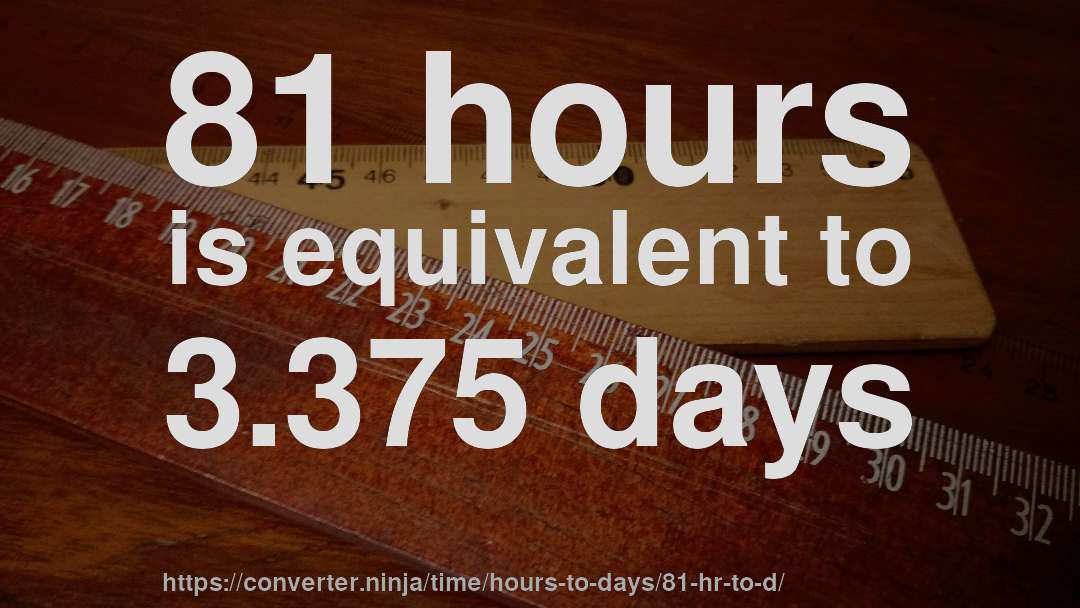81 hr to d - How long is 81 hours in days? [CONVERT] ✔

81 hours is equivalent to 3.375 days.
We know (by definition) that: 1 hr ≈ 0.041666667 d
We can set up a proportion to solve for the number of days.
1 hr 81 hr ≈ 0.041666667 d x dNow, we cross multiply to solve for our unknown x:
x d ≈ 81 hr 1 hr * 0.041666667 d → x d ≈ 3.375000027 dConclusion: 81 hr ≈ 3.375000027 d
The inverse of the conversion factor is that 1 day is equal to 0.296296296296296 times 81 hours.
It can also be expressed as: 81 hours is equal to 1 0.296296296296296 days.
Approximation
An approximate numerical result would be: eighty-one hours is about three point three seven days, or alternatively, a day is about zero point three zero times eighty-one hours.
Units involved
This is how the units in this conversion are defined:
Hours
"Midnight (or noon) on a 12-hour analog clock An hour is a unit of time conventionally reckoned as 1⁄24 of a day and scientifically reckoned as 3,599–3,601 seconds, depending on conditions.The seasonal, temporal, or unequal hour was established in the ancient Near East as 1⁄12 of the night or daytime. Such hours varied by season, latitude, and weather. It was subsequently divided into 60 minutes, each of 60 seconds. Its East Asian equivalent was the shi, which was 1⁄12 of the apparent solar day; a similar system was eventually developed in Europe which measured its equal or equinoctial hour as 1⁄24 of such days measured from noon to noon. The minor variations of this unit were eventually smoothed by making it 1⁄24 of the mean solar day, based on the measure of the suns transit along the celestial equator rather than along the ecliptic. This was finally abandoned due to the minor slowing caused by the Earths tidal deceleration by the Moon.In the modern metric system, hours are an accepted unit of time equal to 3,600 seconds but an hour of Coordinated Universal Time (UTC) may incorporate a positive or negative leap second,[a] making it last 3,599 or 3,601 seconds, in order to keep it within 0.9 seconds of universal time, which is based on measurements of the mean solar day at 0° longitude."
Days
"A day is a unit of time. In common usage, it is either an interval equal to 24 hours or daytime, the consecutive period of time during which the Sun is above the horizon. The period of time during which the Earth completes one rotation with respect to the Sun is called a solar day. Several definitions of this universal human concept are used according to context, need and convenience. In 1960, the second was redefined in terms of the orbital motion of the Earth, and was designated the SI base unit of time. The unit of measurement day, redefined in 1960 as 86 400 SI seconds and symbolized d, is not an SI unit, but is accepted for use with SI. A civil day is usually 86 400 seconds, plus or minus a possible leap second in Coordinated Universal Time (UTC), and occasionally plus or minus an hour in those locations that change from or to daylight saving time."
[1] The precision is 15 significant digits (fourteen digits to the right of the decimal point).
Results may contain small errors due to the use of floating point arithmetic.ncG1vNJzZmibn6PDpr7Tnqlnppmjt6J706KknmeYpMKzv4ytpmacka7AcISQZp%2BrZaSkeqV7